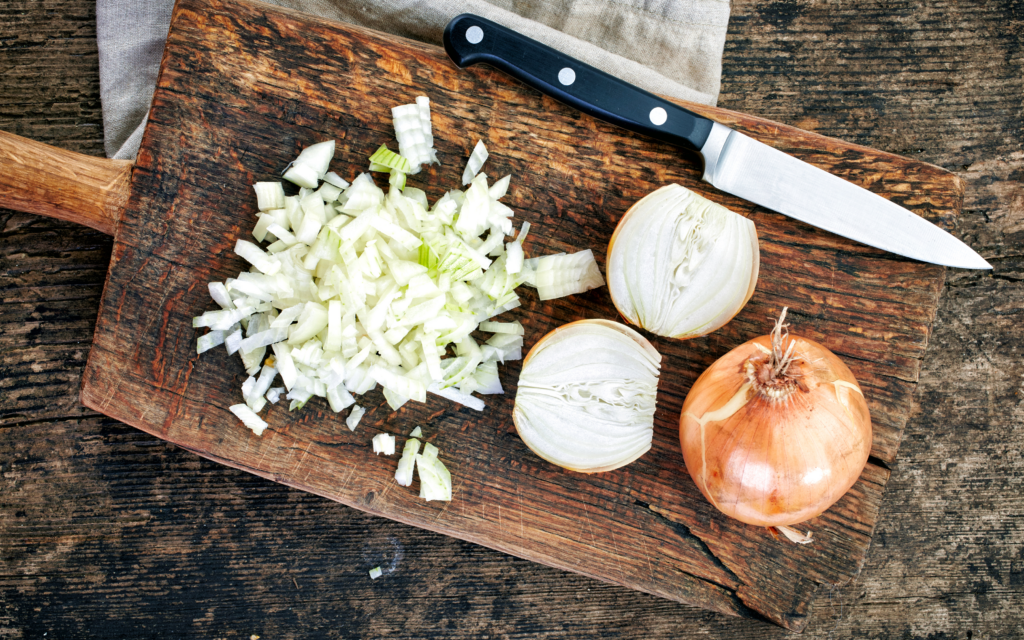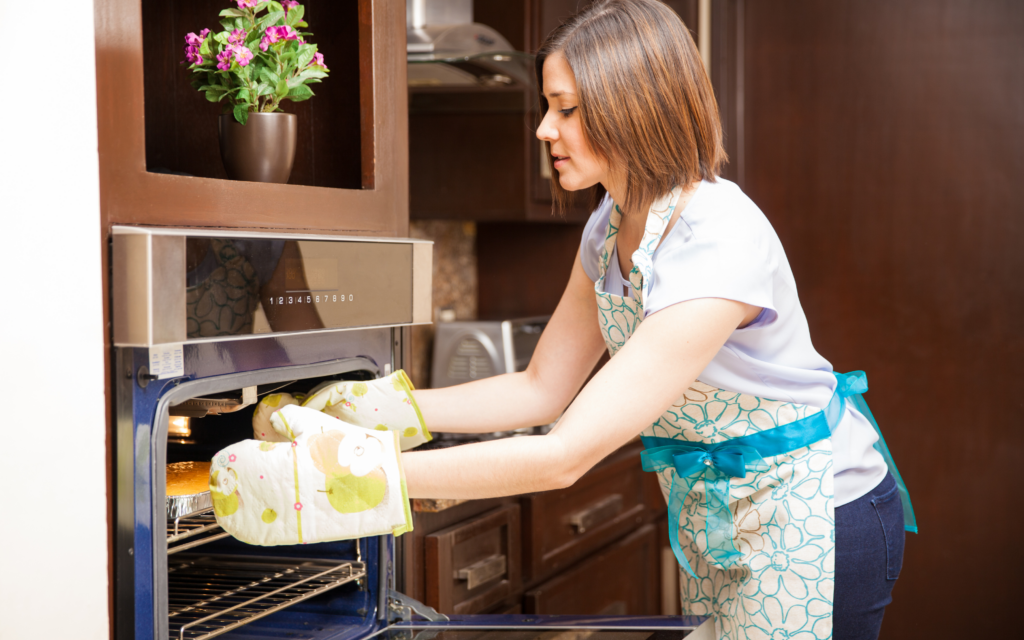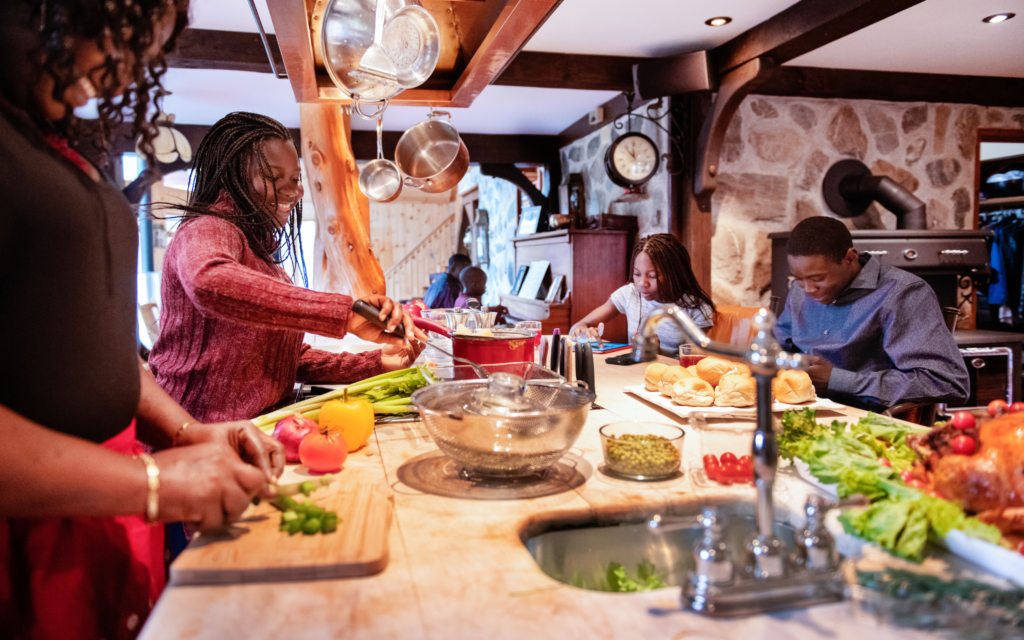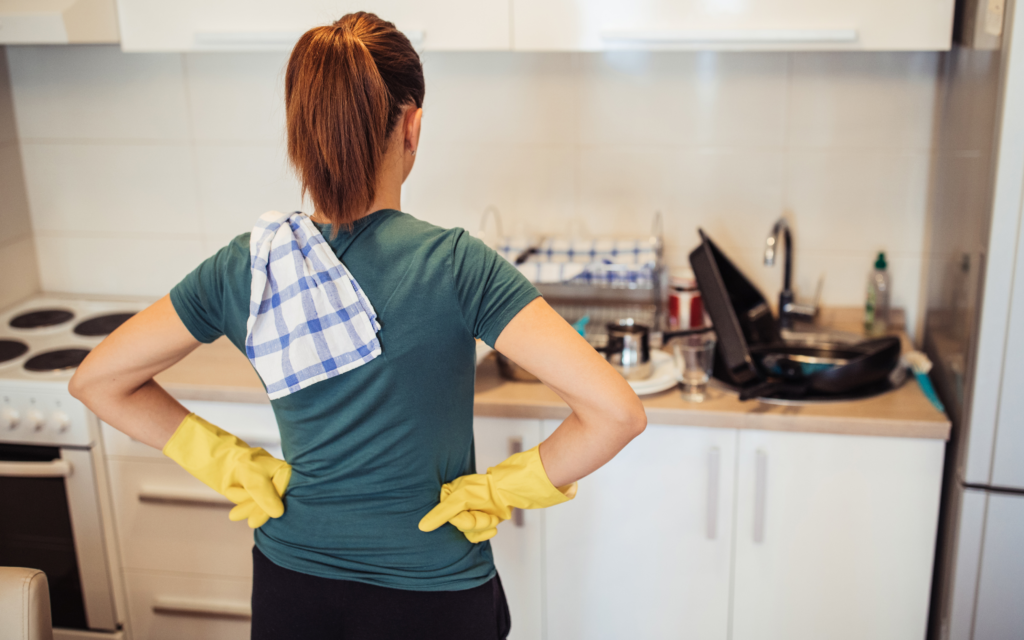Thanksgiving is just around the corner, and that means it’s time to roll up those sleeves, grab your apron, and whip up some delicious holiday favorites! Whether you’re the master chef of your family or just pitching in, spending time in the kitchen can be a highlight of the holiday season. But before you dive in to slice, sauté, and bake your way to a fabulous feast, take a moment to review some cooking safety tips. A little precaution goes a long way to ensuring your holiday is filled with joy—not unexpected trips to urgent care!
Sharp Knives Are Safe Knives
It might sound strange, but dull knives are more dangerous than sharp ones. A dull blade requires more force to cut through food, which increases the risk of losing control and getting hurt. Sharp knives are not only more efficient but also safer. When your knife is sharp, you can focus on your technique rather than trying to muscle your way through whatever you’re chopping.
Before Thanksgiving dinner prep, take a few minutes to sharpen your knives and make sure they’re in good working condition. It’s well worth the time— you’ll find that prepping vegetables, herbs, and even the turkey becomes much easier. Remember, take your time while slicing and dicing. Slow and steady wins the safety race!
Check out this video demonstrating proper cutting technique.
Chop Like a Pro
When chopping, make sure to curl your fingers on the hand that’s holding the food, keeping them tucked under like a claw. This ensures that if the knife slips, it’s much less likely to cut your fingers. Practicing the claw technique might feel a bit awkward at first, but it’s a lifesaver. Plus, you’ll impress your friends and relatives with your professional-level knife skills!
Another great tip is to ensure you have the right knife for the job. Using a paring knife to chop a butternut squash is not only inefficient but also dangerous. Choose a chef’s knife for bigger vegetables and reserve the paring knife for more delicate work. Knowing which tool to use is just as important as knowing how to use

Steam Your Veggies, Not Your Hands
Ovens, stovetops, and pots can get incredibly hot— sometimes deceptively so. Always use oven mitts when handling anything that has been near heat. Resist the urge to use a nearby dish towel instead of a mitt; they may not provide adequate protection, and if they’re damp, they can actually cause steam burns.
If you’re using cloth oven mitts, make sure they are completely dry. Silicone mitts are a great option because they provide great insulation and are waterproof. It’s these little precautions that can make all the difference between a seamless cooking experience and an unfortunate mishap.

Cool in the Kitchen
While we all want our food to be hot, it’s crucial to keep the kitchen’s heat under control— especially when it comes to open flames and hot oil. Keep pan lids nearby to smother any flames and protect from oil spatter. Make sure your kitchen fire extinguisher is nearby and charged before you get started.
Remember, hot oil and water do not mix! Never, under any circumstances, use water to extinguish a grease fire. Instead, cover the pot with a metal lid to cut off the oxygen supply or use baking soda to smother small grease fires. Keeping a box of baking soda within reach while cooking can be a real lifesaver.
Check out this article for more information about controlling kitchen fires.
Stabilize Your Cutting Board
A wobbly cutting board is a fast track to accidental cuts. To keep your board in place, place a damp paper towel or kitchen towel underneath it. This simple trick will prevent the board from sliding around while you’re chopping, helping to keep your hands safe.
Additionally, consider using cutting boards with non-slip feet, which add extra stability. A solid, stable cutting surface makes all the difference when you’re trying to chop vegetables or carve up that Thanksgiving turkey. Safety first, stuffing second!

Clean Up Carefully
Cleaning as you go is a great habit, but there are some important safety guidelines to follow. One key rule is never to drop knives or sharp tools into a sink full of soapy water. It’s easy to forget what’s in the sink, and you could end up grabbing a sharp blade by mistake. Instead, set knives and other sharp tools aside and wash them carefully, one by one.
Also, be mindful of spills. A small splash of oil or stray ice cube on the floor can quickly lead to a dangerous slip. Clean up spills immediately and consider wearing non-slip shoes in the kitchen. A safe cooking environment means fewer accidents and more time enjoying your holiday feast.
Prevent Cross-Contamination
Thanksgiving cooking often involves handling raw meat, like the iconic turkey, alongside fresh vegetables and other ready-to-eat foods. To keep everyone safe from foodborne illnesses, it’s crucial to avoid cross-contamination. Use separate cutting boards for raw meat and vegetables. If that’s not possible, be sure to thoroughly wash your cutting board with hot, soapy water between uses.
The same goes for utensils— don’t use the same knife to cut raw turkey and then chop herbs for garnish without a good wash in between. And always wash your hands after handling raw meat to prevent the spread of bacteria. It may seem like common sense, but in the hustle and bustle of Thanksgiving prep, these steps are easy to forget.

Have Fun and Laugh it Off
While safety is important, so is having fun. Thanksgiving is about bringing loved ones together, creating memories, and sharing a meal made with love. Don’t get too stressed out if things don’t go exactly as planned—they rarely do, and that’s part of the charm. The pie might end up a little burnt, or the turkey might take longer to cook than expected, but those little hiccups are often what make the best stories later on. Enjoy the process, and remember that the most important part of Thanksgiving isn’t what’s on the table— it’s who’s around it.
Even with all of these tips in mind, accidents still happen. If you need help recovering from a shoulder, arm, or hand injury, Alaska Hand Rehabilitation is here to help. Send us a message or call 907-563-8318.


